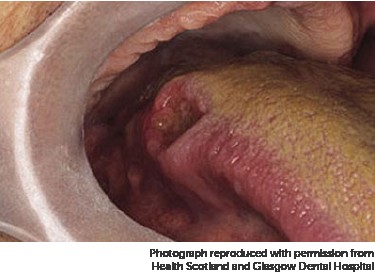Discovering a bump on your tongue can be unsettling. You might be wondering if it’s something serious or just a temporary irritation. While a bump on your tongue can indeed be a symptom of tongue cancer, it’s important to know that there are many less serious reasons why you might develop these bumps. This article will explore the various potential causes of bumps on your tongue, helping you understand when it’s necessary to seek medical advice and what the possibilities could be.
Understanding the Anatomy of Your Tongue
To better understand why bumps can appear, it’s helpful to know the basic structure of your tongue. The tongue is divided into two main parts:
-
The Oral Tongue: This is the part you can easily see and move around – the front two-thirds of your tongue. It’s also known as the body of the tongue. Cancers in this area are classified as mouth (oral) cancers.
-
The Base of the Tongue: This is the back third of your tongue, located near your throat. Cancers in this area are called oropharyngeal cancers.
Both parts of the tongue can develop bumps, and the causes can vary.
Common, Less Serious Causes of Tongue Bumps
Many bumps on the tongue are benign and resolve on their own. Here are some common reasons for non-cancerous tongue bumps:
-
Papillae Irritation: Your tongue’s surface is covered in small bumps called papillae, which contain taste buds. These papillae can become temporarily irritated or inflamed due to spicy foods, acidic drinks, or minor injuries, leading to noticeable, sometimes painful bumps.
-
Canker Sores (Aphthous Ulcers): These are small, painful ulcers that can appear on the tongue, inner cheeks, or gums. While the exact cause isn’t fully understood, they are not cancerous and usually heal within a week or two. They can sometimes present as a bump before developing into an open sore.
-
Oral Thrush (Candidiasis): This fungal infection can cause creamy white or yellowish bumps or patches on the tongue and inside the mouth. It’s more common in infants, the elderly, and people with weakened immune systems.
-
Benign Tumors: Non-cancerous growths like fibromas or papillomas can occasionally develop on the tongue. These are typically slow-growing and not painful, but should still be evaluated by a healthcare professional to rule out anything serious.
-
Trauma or Injury: Biting your tongue, burning it with hot food, or even dental appliances can cause temporary bumps or swelling as the tissue heals.
Tongue Cancer: When a Bump Could Be More Serious
While most tongue bumps are harmless, it’s crucial to be aware that a persistent bump or lump on your tongue can be a symptom of tongue cancer. Tongue cancer falls under the category of head and neck cancers and can develop in either the oral tongue or the base of the tongue.
The most prevalent type of tongue cancer is squamous cell carcinoma. This cancer originates in the squamous cells, which are thin, flat cells lining the mouth, throat, and other areas.
Symptoms of Tongue Cancer to Watch For
It’s important to note that early tongue cancer may not always be painful, which is why awareness of the symptoms is crucial. If you experience any of the following, especially if they persist for more than a couple of weeks, consult your doctor or dentist:
- A lump or sore on the tongue that doesn’t go away: This is the most concerning symptom. It may appear as a bump, ulcer, or thickened area.
- Red or white patches on the tongue: Leukoplakia (white patches) and erythroplakia (red patches) can be precancerous or cancerous.
- Persistent sore throat: A throat that remains sore without improvement.
- Difficulty or pain when swallowing (dysphagia): A sensation that food is getting stuck or pain while swallowing.
- Numbness in the mouth: Unexplained and persistent numbness.
- Pain or burning sensation on the tongue: Discomfort that doesn’t subside.
- Changes in speech or tongue movement: Difficulty moving your tongue or speaking clearly.
- Lump in the neck: Swollen lymph nodes.
- Unexplained bleeding from the tongue: Bleeding not caused by injury.
- Ear pain or hearing loss in one ear: Less common, but can occur with base of tongue cancers.
- Unexplained weight loss: Significant weight loss without trying.
It’s important to remember that these symptoms can also be related to conditions other than cancer. However, it is always best to get them checked by a healthcare professional to rule out serious causes.
Risk Factors for Tongue Cancer
While anyone can develop tongue cancer, certain factors increase the risk:
- Smoking: Smoking tobacco products (cigarettes, cigars, pipes) is a major risk factor for oral and tongue cancers.
- Excessive Alcohol Consumption: Regularly drinking large amounts of alcohol increases the risk.
- Human Papillomavirus (HPV) Infection: Certain strains of HPV, particularly HPV-16, are strongly linked to oropharyngeal cancers, including cancers of the base of the tongue. HPV is a common virus, but in some individuals, it can lead to cancer development.
Having these risk factors doesn’t guarantee you will get tongue cancer, but it does elevate your chances.
Diagnosis and What to Do
If you have a bump on your tongue that concerns you, especially if it persists or is accompanied by other symptoms mentioned above, it is vital to seek medical advice. Your doctor or dentist will:
- Perform a physical examination: This includes examining your tongue, mouth, and neck, checking for any abnormalities or swollen lymph nodes.
- Biopsy: If a suspicious area is found, a biopsy (taking a small tissue sample) will be performed. This is the only definitive way to diagnose cancer. The tissue is examined under a microscope by a pathologist.
- Further Investigations: Depending on the findings, you may need further tests like MRI, CT, PET-CT scans, or endoscopy to determine the extent of the condition.
Early detection of tongue cancer significantly improves the chances of successful treatment.
In Conclusion
Finding a bump on your tongue can be alarming, but remember that most bumps are not cancerous and are caused by minor irritations or conditions. However, it’s crucial to be aware of the potential symptoms of tongue cancer. If you have a persistent bump, sore, or any of the concerning symptoms discussed, don’t hesitate to consult your doctor or dentist for prompt evaluation and peace of mind. Early diagnosis is key to effective treatment and better outcomes.

